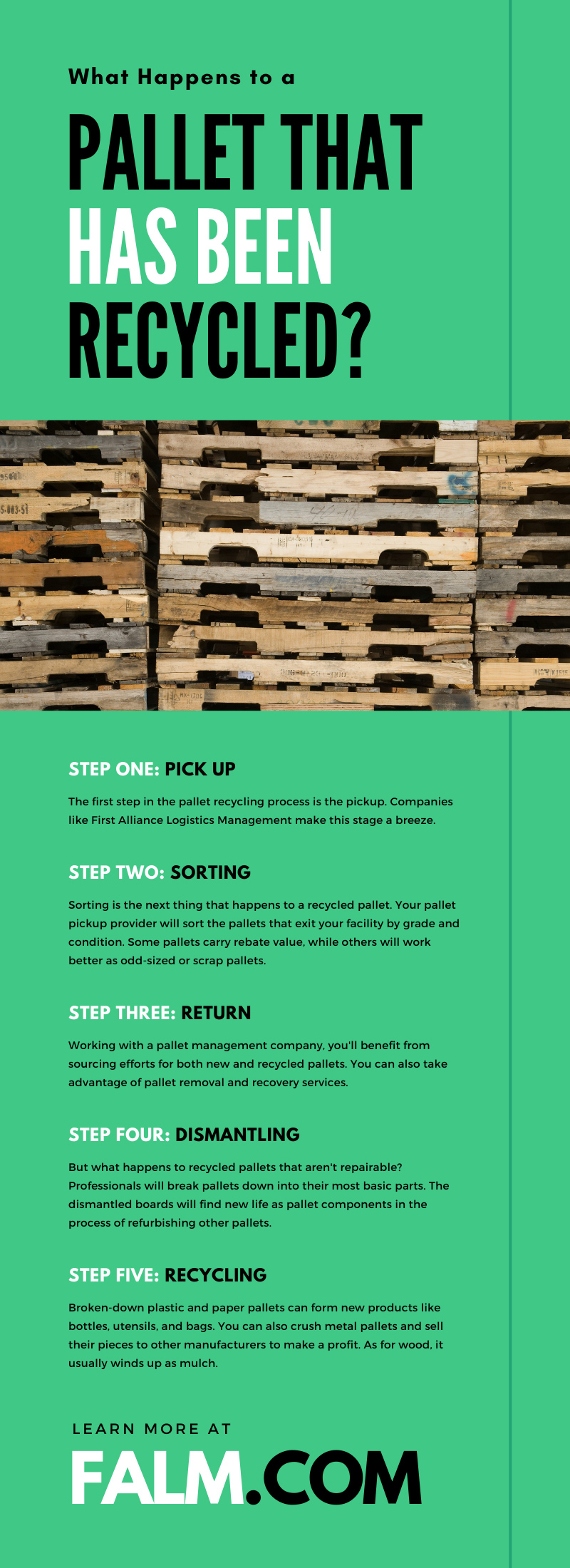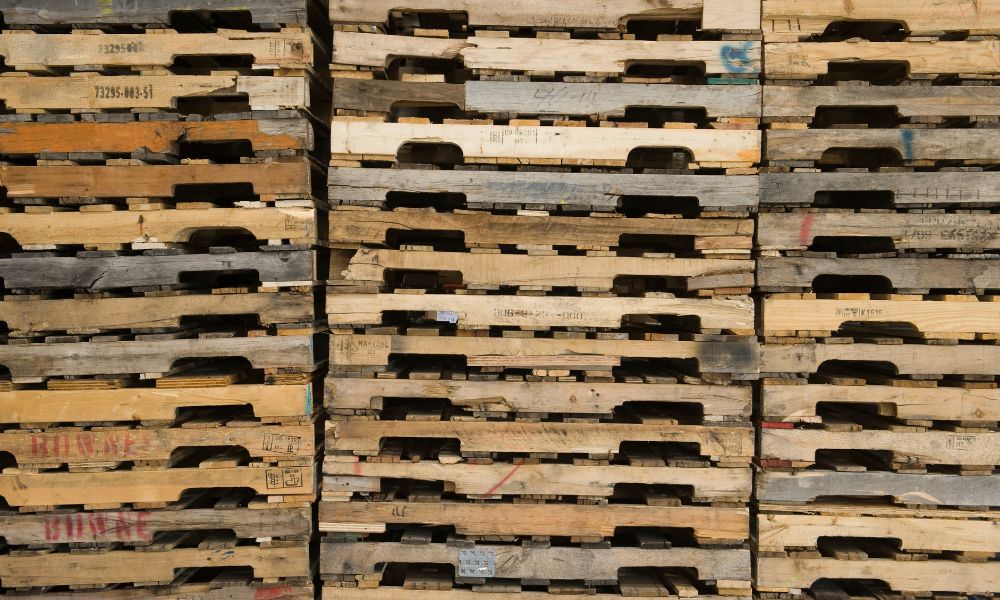If you aren’t using pallet recycling services, you’re missing out on a valuable business opportunity. From reducing your environmental impact to cutting supply costs, recycling used pallets benefits everyone. Scraps from repurposed pallets have a variety of sustainable and professional uses, making the process worth looking into.
Sometimes, understanding what happens to a recycled pallet can help you gain some perspective. Salvaging old pallets doesn’t only include wooden ones; you can also repurpose metal, paper, and plastic pallets for other uses. Explore the ins and outs of the pallet recycling process while adding pallet recycling services to your operations.
Step One: Pick Up
Some businesses may toss their used pallets, which equates to landfill costs. Many feel like the recycling process is complicated. There are so many unanswered questions, such as:
- Where do you take your pallets?
- How do you transport them?
- Who do you call?
The first step in the pallet recycling process is the pickup. Companies like First Alliance Logistics Management make this stage a breeze. All you need to do is request a consultation, get your quote, and set up your pickup time.
From there, we will design a pickup program to address your business’s unique concerns. From arranging transportation, hiring a crew to do the heavy lifting, and staging the necessary program equipment, your pallet pickup plan will incorporate a solution that meets your particular needs. Your service provider will also coordinate with recycling centers to ensure your pallets end up in the right spot.
Step Two: Sorting
Sorting is the next thing that happens to a recycled pallet. Your pallet pickup provider will sort the pallets that exit your facility by grade and condition. Some pallets carry rebate value, while others will work better as odd-sized or scrap pallets.
Pallet professionals assign “grades” to pallets to communicate their condition. While there are many variations within each grade, the standards look like this:
- Grade A Pallets: Pallets with an “A” grade haven’t undergone repairs. They are essentially brand new. Pallets with high “A” grades look like they’re in pristine condition. Lower graded “A” pallets may need repairs in the near future.
- Grade B Pallets: Pallets with a “B” grade have undergone a few repairs. Usually, this involves fixing or replacing boards and plugs. Even though they aren’t new, they still have integrity and qualify for pallet recycling.
- Grade C Pallets: Pallets with a “C” grade have gone through several stages of repair. They usually look rough and are often missing boards, plugs, and other integral components. These pallets are typically safe to use and usually become scrap material.
Step Three: Return
Working with a pallet management company, you’ll benefit from sourcing efforts for both new and recycled pallets. You can also take advantage of pallet removal and recovery services. This way, you won’t waste precious time and resources getting your important equipment back in operation.
Find a reverse logistics service that has locations all over the country. Businesses like FALM have regional recyclers in multiple states, making pallet recovery and recycling programs accessible for many businesses.
The return process should be simple. Having one point of contact streamlines communication. Your reverse logistics service should also offer consolidated reporting and standard invoicing. Fortunately, FALM provides all of these benefits and more.
Step Four: Dismantling
Knowing that your pallets might have extra life in them is refreshing, to say the least. But what happens to recycled pallets that aren’t repairable? Many people believe that materials wind up in landfills. If you don’t use reputable pallet recycling services, this may be true.
However, pallet materials are often repurposable. Professionals will break pallets down into their most basic parts. The dismantled boards will find new life as pallet components in the process of refurbishing other pallets.
Step Five: Recycling
Finally, it’s the moment you’ve all been waiting for! Recycling pallets takes many forms. What happens to your recycled supplies often depends on the material itself and how much wear and tear it has. For example, wood from pallets that don’t qualify for recovery can help patch up other pallets in small pieces.
However, some pallets are entirely unusable. Still, this doesn’t mean you have to accept a total loss. Broken-down plastic and paper pallets can form new products like bottles, utensils, and bags. You can also crush metal pallets and sell their pieces to other manufacturers to make a profit.
As for wood, it usually winds up as mulch. Professionals will use high-powered magnets to grab nails, staples, and other metal hardware to purify the wood.
What Happens to Discarded Pallets?
Recycling pallets is vital because the alternative has major environmental consequences. Discarded pallets wind up in landfills and occupy a ton of valuable space. Since treated lumber can take decades to degrade, waste professionals have to use more land to create dumps to accommodate more waste.
Businesses that don’t recycle their pallets might not recycle other items, either. This inaction may point to a problem within their corporate culture. Since big corporations contribute to most of the world’s waste problem and environmental destruction, taking action toward sustainability is crucial.
Why Is Pallet Recycling Important?
You already know that pallet recycling positively impacts the environment; that much is crystal clear. However, recycling pallets is essential for so many other important reasons.
First, repurposing your pallets improves safety conditions. Since services like FALM offer rebates, businesses are less likely to hang on to broken supplies that could injure employees and damaged products. It also frees up space you normally would use to store your defunct materials.
Speaking of rebates, recycling pallets save money in more ways than people expect. Sure, repurposing allows you to cut material costs; however, you can turn a profit selling broken or unused pallets and earning cash back through various recycling, recovery, and return programs.
First Alliance Logistics Management Is a One-Stop Shop for Your Pallet-Related Needs
As you can see, what you do with your pallets doesn’t only affect your business; you are a small cog in the giant machine that is the supply chain. Enlist the help of First Alliance Logistics Management so you can better understand your role and make better decisions. Fill out a contact form to request additional information so that we can revamp your pallet management plan.


